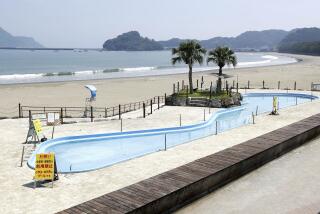Quake roils stocks again
The specter of a potential nuclear disaster in Japan and the persistent unrest in oil-producing nations is sending global stock markets reeling one day after the next, leaving dispirited investors to ponder when the agony will end.
Most major U.S. stock indexes have now given back all their gains on the year, with the Standard & Poor’s 500 and Nasdaq composite each forfeiting nearly 7% advances. The Dow Jones industrial average is clinging to a meager 0.3% gain, but has tumbled seven of the last nine days after its 242-point drubbing Wednesday.
The latest daily plunge was precipitated by comments Wednesday from a European energy official, who said Japan’s crippled nuclear plant was “effectively out of control” and could “pose a threat” to residents on the island nation.
The sell-off easily could continue as gruesome images from Japan’s twin catastrophes of earthquake and tsunami fill investors’ television screens, and as nuclear experts uncork increasingly ominous predictions of worst-cases scenarios.
“We have no way of knowing if, at one extreme, this will prove to be a non-event, or at the other extreme, we end up with a nuclear meltdown,” said Phil Orlando, chief equity market strategist at Federated Investors in New York.
But as dire as Japan’s crisis appears to be, market pros urge investors to stay calm and coolly assess the effect on their portfolios.
Many investors will find that their direct exposure to Japanese stocks is limited, and most experts are sticking to the belief that the global economy can withstand the turmoil in Japan.
“We don’t think this event — as awful as it is — is going to affect the long-term earning power of companies and markets we’re investing in,” said Mark Wilson, a financial planner at the Tarbox Group in Newport Beach. “It’s a temporary event.”
Some investment firms have begun to buy Japanese stocks on the notion that badly beaten-down stock prices will rebound as soon as the fear of a debilitating nuclear meltdown evaporates.
The underlying fundamentals remain intact for the large companies with multinational operations, especially in the fast-growing Pacific Rim, optimists said. The fortunes of the companies, in other words, aren’t beholden to the domestic Japanese economy.
That thinking sparked a 5.7% snapback rally in Japan’s Nikkei stock index on Wednesday, though the index still is down 12.8% since the quake.
“You have some world-class companies that have been knocked down by double-digit percentages in price,” said Ray Mills, manager of the T. Rowe Price Overseas Stock fund. “Some of them are looking pretty attractive at these levels.”
Mills has added to some of his positions in Japanese stocks in the last few days. He wouldn’t reveal which companies he’s buying, but year-end filings show the fund’s top Japanese holdings include Toyota Motor Corp., Mitsubishi Electric Co., Canon Inc. and Honda Motor Co.
Still, anyone buying Japanese shares has to consider the longer-term economic and demographic trends that have cast a pall over the Japanese market for years.
Even before the massive rebuilding that will follow the quake and tsunami, the country’s ratio of government debt to gross domestic product is a whopping 200%, far surpassing all other industrialized nations.
And Japan’s aging population long has been viewed as a wet blanket on the nation’s economic prospects, partly because there are a declining number of younger workers available to finance the healthcare expenses of a rising number of elderly.
The global stock markets’ woes follow a boisterous two-year stock rally that had many investment experts expecting a pullback even before the Japanese quake.
Still, that hasn’t made it any easier for individual investors who only recently had begun returning to stocks after getting shellacked in the global financial crisis and Great Recession.
Many market watchers said the best thing small investors could do is wait out the downturn.
“Virtually every year, there’s a 10% dip in the stock market,” Tarbox’s Wilson said. “If you can’t live through those, I question whether you should own stocks at all.”
Beyond Japan, the market squall could offer an eventual buying opportunity for investors looking to move money into emerging markets.
After a blazing rally from the market low in late 2008, the iShares MSCI emerging-markets ETF, a widely followed gauge for emerging markets, has cooled off, falling 6.4% this year.
Financial advisors recommend that investors be cautious, saying valuations have improved but that inflation is a threat in the super-hot Asian and South American economies.
“It’s certainly better than it was at the end of the year,” said Mills of T. Rowe Price. “In places like India, China and Brazil, not much has changed [in projected economic growth], but prices have come down quite a bit. It is a better time than it was.”
Times staff writer Tom Petruno contributed to this report.
More to Read
Inside the business of entertainment
The Wide Shot brings you news, analysis and insights on everything from streaming wars to production — and what it all means for the future.
You may occasionally receive promotional content from the Los Angeles Times.










